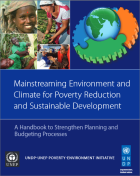Mainstreaming environment and climate for poverty reduction and sustainable development
Mainstreaming environment and climate for poverty reduction and sustainable development

This handbook is designed as guidance for policymakers and practitioners to mainstream pro-poor environment and climate concerns into planning, budgeting and monitoring. Mainstreaming is achieved by putting poverty-environment issues at the heart of government—in other words, by taking these issues into mainstream economic decision-making processes, particularly the national and subnational planning and budgeting processes led by ministries of finance, planning and local government, and supported by ministries of environment. Over the last 10 years, the Poverty-Environment Initiative (PEI), a joint programme of the United Nations Development Programme and the United Nations Environment Programme, has successfully supported the integration and implementation of pro-poor, environmental sustainability objectives into national, subnational and sectoral development policies, plans and budgets to contribute to poverty alleviation and an inclusive, green economy. The handbook provides guidance and concrete examples from PEI experience in Africa, Asia-Pacific, Europe and the Commonwealth of Independent States, and Latin America and the Caribbean, as well as from other initiatives.







